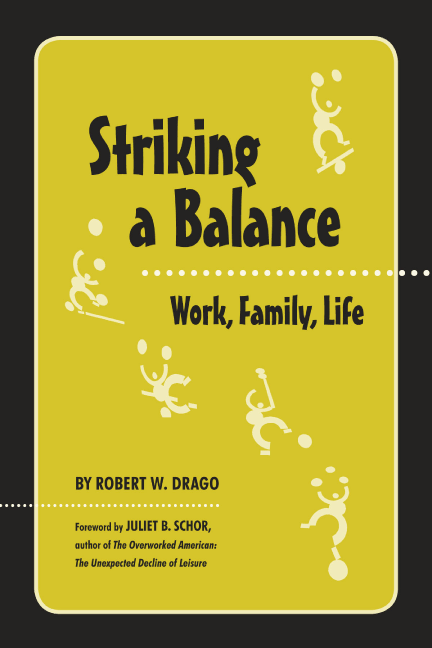Striking a Balance

- Edition:
- 1st
- Date of publication:
- January 2007
- ISBN:
- 978-1-878585-62-2
- Pages:
- 182
- Price:
- $18.95
In this provocative book, economist and work/life expert Robert Drago constructs a unique vision of the meaning of balance, unmasking the real reasons most Americans lead unbalanced lives. Sifting through the vast body of relevant research from a range of academic disciplines, including new findings from the authorís own studies, Striking a Balance: Work, Family, Life examines the deeply held but unexamined beliefs about work, womanhood, and society that are responsible for our out-of-balance lives. In his optimistic final chapter, Drago calls on us to challenge those beliefs and provides a roadmap for change. If we take this path, he argues, we will not only improve life balance but also address the nearly one-fifth of our population who require but do not receive adequate care, the "new gender gap" between women who care for others and women who succeed in high-powered careers, and even the rise in income inequality.
Praise for Striking a Balance: Work, Family, Life
Bob Drago provides us with a powerful new framework to help solve the problem of imbalance in contemporary society— some people have too much work, many have too little income and not enough care-giving, and virtually everyone suffers from a lack of gender equality. To the work-life paradigm he adds the almost forgotten concept of leisure, with surprising results. His real-life solutions are inspiring, his policy prescriptions are simple, clear, and mercifully few. This book is an enjoyable, engaging read. Read it and change your life and the world.
—Heidi Hartmann, Ph.D., President, Institute for Womenís Policy Research
Framed in terms of the care gap, the new gender gap between mothers and others, and the widening income gap, this lively and accessible book makes it clear why so many of us find it difficult to strike a balance in our lives. It can be read with profit by students of labor economics, those concerned with women and work, or anyone who has ever had to juggle the demands of care and career.
— Eileen Appelbaum, Director, Center for Women and Work, and Professor, School of Management and Labor Relations, Rutgers University
It is hard for American working parents to achieve balanced lives, but as Bob Drago argues in this important and timely book, we can change that. We know we have a crisis when, as his research shows, over half of the mothers who teach college chemistry and about 40 percent who teach English say that they returned to work sooner than they wanted after having a child because they wanted to be taken seriously as academics, and many of them felt forced to choose their work over their children. Rather than groaning about forced imbalance, however, Drago powerfully marshals the evidence and points to the models we need to create balance for both sexes. A must read for us all.
—Arlie Russell Hochschild, author of The Time Bind and The Commercialization of Intimate Life
This book is for anyone who feels that life is complicated and getting more so all the time. In clear language Drago gives data to show that Americans are working more and defines 3 important gaps Americans face: a care gap, a gender gap, and an income gap. These are interrelated, of course, as Drago makes clear. And he contributes to our understanding of the gender gap by expanding it to include the gap between women who are involved in actual care work (whether paid or not) and those successful in professional jobs and hence not directly involved in care. He anchors his discussion in three norms, all of which contribute to these gaps: motherhood, ideal worker, and individualism, and supports his discussion with both data and stories. A particularly interesting formulation is his definition of balance, by which he means involvement in all three of paid work, unpaid work, and leisure. He describes the kind of social infrastructure necessary to support such balance for all people in our society and ends with a work and family bill of rights. A great discussion of the challenges we all face.
—Lotte Bailyn, T Wilson Professor of Management, MIT Sloan School of Management
Written by a true scholar in the work/family domain, this book captures twenty years of research, including the most current. Further, it is eminently readable for scholars, practitioners, and working parents. sensible and empathic.
—Patricia Raskin, Associate Professor of Psychology and Education, Teachers College, Columbia University

